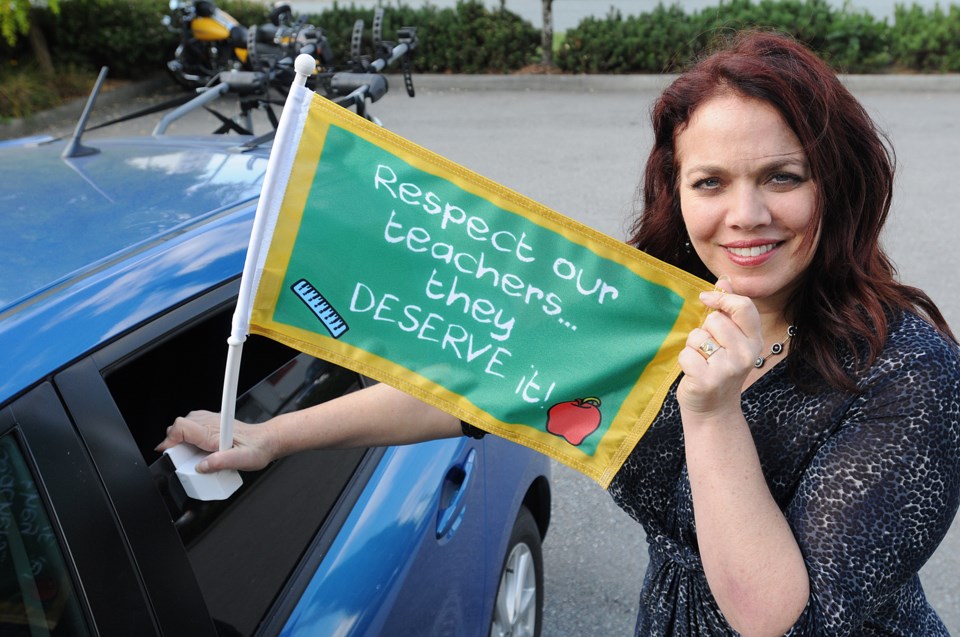Teachers know best and they deserve respect, insists business owner and former teacher Susan Braverman. She wants to see this sentiment flying and plastered across the province.
Her company The Flag Shop started printing posters, banners and flags that read “Respect our teachers… they DESERVE it!” Monday.
“I’ve just been outraged,” Braverman said. “I didn’t think the strike would go on this long.”
The Flag Shop is donating flags and posters to teachers who haven’t been paid since June and can’t afford to buy them, and directing proceeds to making additional related products and to teachers.
The store has a colour poster and a black and white poster that kids can colour.
“My son said, ‘So how much money am I worth to the government, mommy?’” Braverman said. “He’s 12… He knows enough that it’s about money.”
Braverman isn’t the first Vancouver business to publicly support teachers. Bandidas Taqueria, which is owned by former teachers, is investing 100 per cent of its profits on Wednesdays into the
B.C. Teachers’ Federation strike fund and at least 172 businesses in the province are backing B.C. public school teachers.
Braverman taught at L’Ecole Bilingue French immersion elementary school in 2005/2006. She was disappointed that after she went on strike for two weeks without strike pay she didn’t see her class size or composition change. “I had 24 of them in the class and the problem is the kids that fit into the mould, no problem,” she said. “But not all kids fit into the mould.”
The BCTF says learning conditions have worsened in the last 12 years.
Braverman trusts that teachers’ salary demands and concerns about class size and composition are reasonable.
“Teachers do not get rich,” Braverman said. “We had a water fund and a coffee fund and we ran out of pencils in about April and May so I had to go buy my own pencils for the classroom.”
The average teacher in B.C. in 2011-2012 had worked 12.6 years and earned a salary of $73,291, according to the Ministry of Education. Teachers work an average of nine or 9.1 hours a day, according to the B.C. Public School Employers’ Association.
Bravermen left teaching to help her mother with The Flag Shop. Braverman was a single mother with student loans who was paying a mortgage and for private education for her daughter who has attention deficit hyperactivity disorder and, Braverman says, couldn’t be in a classroom with 30 kids.
Small business owners across the province don’t share Braverman’s views, according to survey results released by the Canadian Federation of Independent Business Wednesday morning.
Only five per cent of the 1,092 responses to the web-based survey conducted from Aug. 19 to Sept. 9 supported an increase wages and benefits in line with BCTF demands, 13 per cent said there should be no increase at all, and 66 per cent believe any new collective agreement should be in line with what has been negotiated with other public sector unions.
Thirty-eight per cent of business owners said strike-related savings, an estimated $12 million a day, should go to parents, 11 per cent said reserves should go to teachers and 45 per cent said savings should be used to pay down the provincial debt.
Laura Jones, executive vice-president of the federation, was surprised 45 per cent of respondents said savings should go to servicing the provincial debt.
“This result speaks to the need to have some sensible voices in the middle beyond those who are directly involved in this dispute to weigh in because this does have big consequences for the future of our province,” she said.
Eighty-seven per cent of survey respondents said balancing the budget should continue to be the government’s top priority, and Braverman agrees.
But she also believes the government should invest money into education first and then cut billions elsewhere in its budget.
Braverman says she hadn’t realized how defeated teachers have been feeling.
I’ve had teachers on the phone with me crying and thanking me,” she said. “I gave them hope.”
This story has been modified since it was first posted.
twitter.com/Cheryl_Rossi



